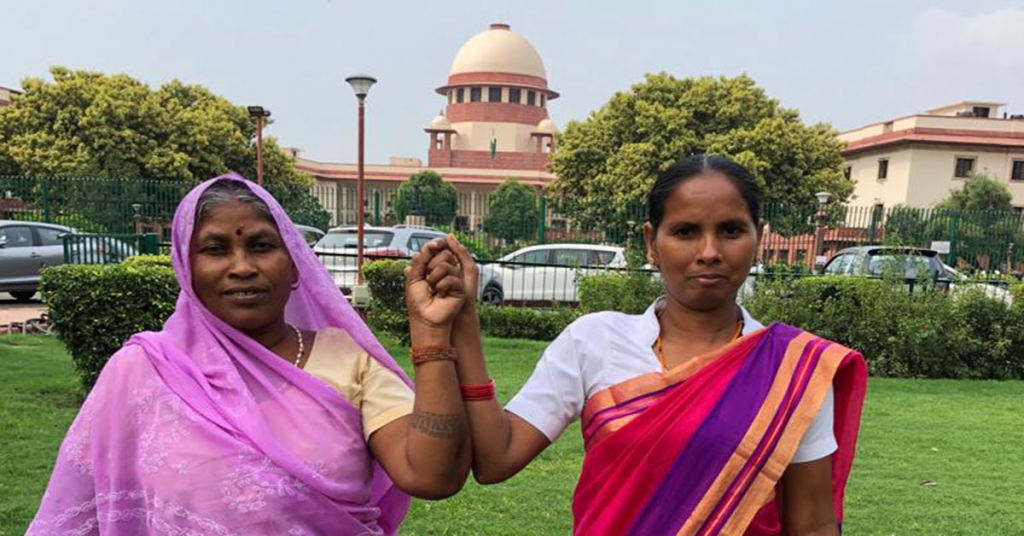
Sokalo Gond and Nivada Rana lead the campaign for Forest Rights in SC Intervention Application backed by CJP and AIUFWP
05, Aug 2019 | CJP Team
Adivasi human rights defenders Sokalo Gond and Nivada Rana have moved Supreme Court praying for justice for millions of forest dwellers, especially women, who have been denied forest rights, and now face the prospect of eviction from their traditional habitats. The duo have filed an intervention application in the ongoing case led by Wildlife First.
It may be recalled that on February 13 this year, the Supreme Court had ordered the eviction of thousands of Adivasi and forest dwelling families from their traditional habitat. Though the order was subsequently stayed, the fate of these people still hangs in the balance and their future remains uncertain. The loss of not just their homes, but also their livelihoods threatens to deal twin body blows from which these marginalised and vulnerable people are unlikely to recover.
CJP stands with the millions of Adivasis whose lives and livelihoods are threatened by the shocking order by the Supreme Court. We are working to ensure the forest rights of Adivasis in Sonbhadra, Uttar Pradesh, and to deepen our understanding of the Forest Rights Act and support Adivasis’ struggles across the country. Please support our efforts by donating here.
In the five months since then, 19 intervention applications have been filed in the matter, all defending the constitutional validity of the Forest Rights Act 2006, a historic legislation that brings a jurisprudential shift in recognising the livelihood rights of traditional forest Dwellers, Adivasis and Dalits.
Sokalo and Nivada’s intervention application is supported by the All India Union of Forest Working People (AIUFWP) and Citizens for Justice and Peace (CJP), two organisations that have been actively campaigning for forest rights. What makes this intervention application special is that it explains how the law is in statutory line with Schedules V, VI and IX of the Constitution. The intervention application may be read here:
Forest Rights Act 2006 is the first and only law that recognises the independent rights of women over land and cultivation. The law was brought in to set right the imbalance of power in favour of a Repressive Forest Department empowered by the colonial-era Indian Forest Act of 1927.
Adivasis and forest dwelling communities have already borne the brunt of historical injustices at the hands of the British colonists who brought about legislations to appropriate forest land and produce. What subsequent administrations failed to acknowledge is that these traditional forest dwelling communities are also the ones protecting our environment and biodiversity from twin threats from greedy corporations and climate change.
Moreover, counter affidavits have been filed by at least 10 state governments.
Related:
Over 30,000 Adivasis and Forest Dwellers take to the streets
Sokalo: An Adivasi warrior who defends her people
Lobby of Corporate Interests, Bureaucrats and Mafia looting Forest Land: Roma
Sonbhadra’s Mahua Coloured Dreams
Rajkumari Bhuiya: Songs as her tool, FRA activist marches on
Sokalo: An Adivasi warrior who defends her people
Lobby of Corporate Interests, Bureaucrats and Mafia looting Forest Land: Roma
Sonbhadra’s Mahua Coloured Dreams
Rajkumari Bhuiya: Songs as her tool, FRA activist marches on










